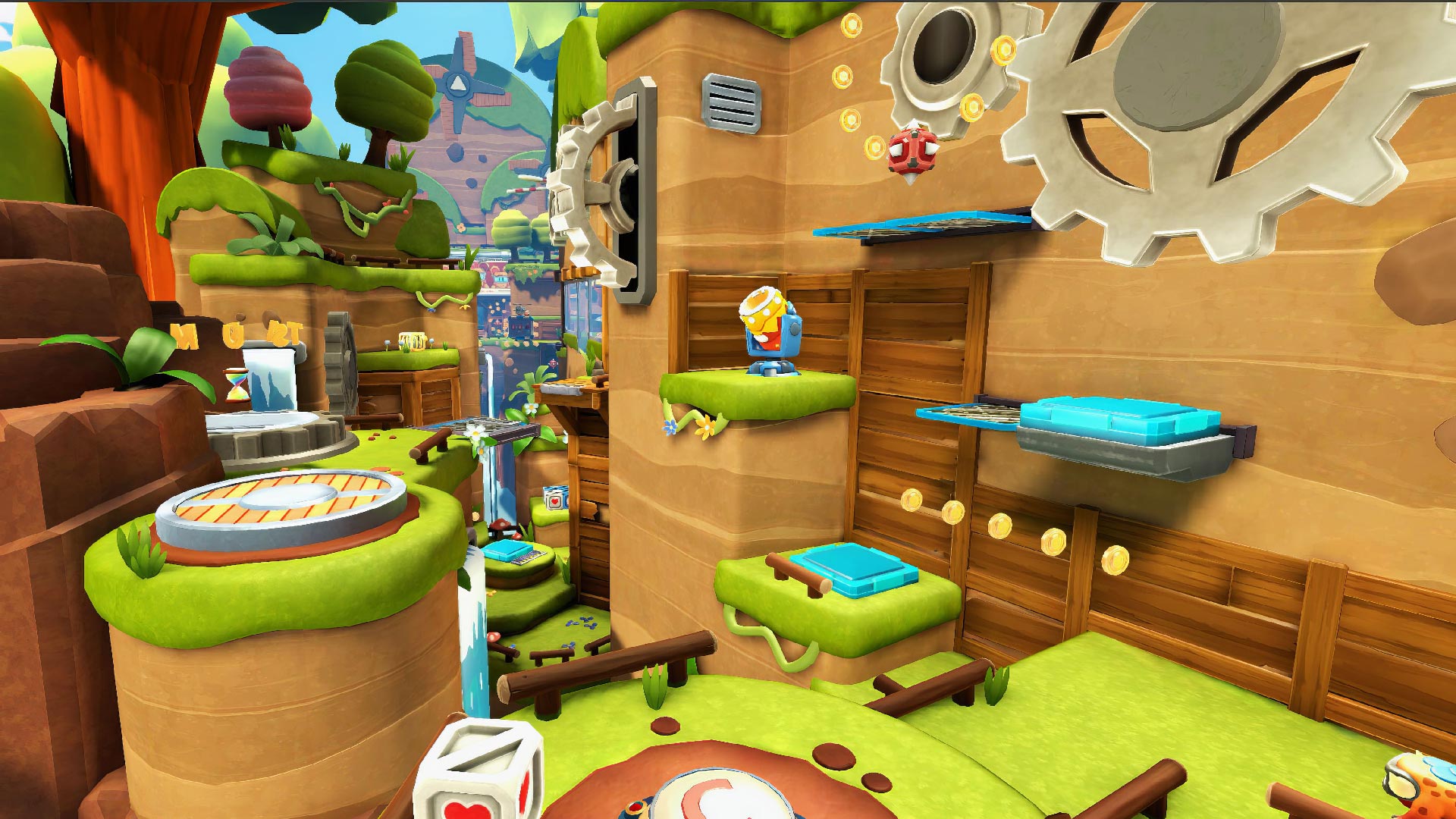Max Mustard may be a bit of a curveball when it comes to names, but this traditional 3D platformer reimagined for VR delivers in nearly every other way, serving up some very Astro Bot Rescue Mission (2018) and Lucky’s Tale (2016) vibes in the process.
Max Mustard Details:
Available On: Quest 2/3/Pro (coming later to Steam & PSVR 2)
Reviewed On: Quest 3
Release Date: March 21st, 2024
Price: $30
Developer: Toast Interactive
Gameplay
Max Mustard isn’t reinventing the wheel here: it’s a solid, extremely well-built 3D platformer that, for all its positives, is a pretty standard experience overall if you’ve played any 3D platformer in the past 30 years, flatscreen or otherwise.
That’s probably the most negative thing I’ll say about this plucky little adventure, which tasks you with guiding the eponymous rocket-boot-clad companion through a world of fairly easy enemies, less easy environmental stuff, and four boss encounters that follow the strict orthodoxy of a ‘hurt it three times and it dies’ variety.

While the story is fairly forgettable—delivered almost entirely through letters that pop up at the end of levels—the action rarely disappoints, as you’re served up straight shots through 40 bespoke levels, many of which harken back to the Super Mario titles from the late ’80s and early ’90s.
That said, there isn’t a ton of enemy variety, as all baddies regardless of movement or attack style only take a single bonk on the head to kill, making enemies less interesting than the admittedly very cool environmental gadgets that you start encountering around the second (of four) worlds. Those fun and inventive moving platforms and increasingly difficult environmental traps are the real stars of the show here, it seems.
And if you haven’t noticed from the clip above, Max Mustard is unabashedly a love letter to those platformers past and present, like Crash Bandicoot and Super Mario World, and the more recent Super Mario 3D Land, but also the headlining VR platformers of today too, including the illustrious Astro Bot Rescue Mission on PSVR and Lucky’s Tale on PC VR, PSVR and Quest. With the level of fit and finish, and first-person interaction (more on that below), you might even think of Max Mustard as the Astro Bot of the Quest platform.
And like those platformers from years past, Max Mustard also offers up the familiar overworld map that takes you linearly to the final boss battle, which (no spoilers!) satisfyingly puts together all of the skills you learned throughout the game.
Along the way you’ll find minigames and the occasional shop too where you can spend coins on abilities, such as extra hearts, coin bonuses, and new combat moves. You’ll want (but probably not really need) those new moves too, as levels start to ramp in difficulty around world three, which introduces some challenging environmental obstacles, like boxes that disappear and reappear to the beat of the game’s soundtrack, torrents of cannonballs, one-use jump pads, and more. Having an extra heart, a better attack move, or rocket boots that do damage to enemies is all a neat bonus to help out.
You wouldn’t be far off in calling Max Mustard the “spiritual successor” to Sony’s Astro Bot, because like Astro Bot every so often you’re given first-person gadgets, like a dart gun and a fan gun, which you use in certain levels, the dart gun making the biggest impact throughout the game. Here I am blasting at incoming rockets from the game’s tutorial boss:
Still, I wish the first-person gadgets were a little better integrated into regular levels, and had more variation overall considering how cool they can be. You do however get the chance to hone your shooting skills in minigame challenges where you can earn coins to use in the shop, as well as get extra ‘mudpups’, which are normally littered throughout regular levels, acting as a sort of secondary currency which are used to unlock levels as you move forward.
As for enemies, regular baddies don’t really put up much of a challenge, however the game’s four main boss battles are significantly more interesting, each of them staying very loyal to the well-worn platforming tropes you’re probably used to. That said, it’s hard not to smile at just how well Max Mustard nails the whole aesthetic and feel of basically everything.
Max Mustard took me around five hours to complete, although I took it pretty slow due to wanting to collecting all three mudpups found in each level. You don’t need to be a completionist to get through the game with ease though, which could take you three to four hours overall.
Immersion
Max Mustard is stupid cute, and offers a lots of level variation in both functional design and overall feel. Here’s me using the fan gun to suck up enemies and errant coins after having splashed down into the water—the sort of totally unexpected one-off level transitions you’ll experience throughout.
That said, first-person interactions are comparatively rare in Max Mustard, so you’ll be bopping around as Max most of the time instead of dealing with enemies like you see in the clip above. That puts an increased importance on the visual and functional aspects of levels, which are thankfully so rock solid that it’s easy to snap into your new ‘floating head’ POV and enjoying the game’s bright and colorful art style.
Again, I wish there were more first-person gadgets, although you have to give it to Max Mustard for including them at all, as the game seems to prioritize fast and fluid movement through levels instead of the heavier Astro Bot-y mix of first and third-person gameplay.
Comfort
The game’s camera necessary follows around Max, but does so in a way that’s gentle and comfortable. The decision by the studio to include snap turning as a purchasable upgrade back at the shop however feels a bit weird, as it’s pretty necessary to reposition yourself when turn around in levels to grab coins or mudpups you may have missed. Granted, this feature is unlocked with in-game coins, although it should be a standard movement scheme out of the box.
There are a few moments of forced motion in one-off events, although nothing that should set off alarm bells in motion sick-prone users, making Max Mustard pretty much perfect for anyone, including VR first-timers.
Max Mustard’ Comfort Settings – March 21st, 2024 |
|
Turning |
|
| Artificial turning | |
| Snap-turn | ✔ |
| Quick-turn | ✖ |
| Smooth-turn | ✖ |
Movement |
|
| Artificial movement | |
| Teleport-move | ✖ |
| Dash-move | ✖ |
| Smooth-move | ✔ |
| Blinders | ✖ |
| Head-based | ✖ |
| Controller-based | ✔ |
| Swappable movement hand | ✖ |
Posture |
|
| Standing mode | ✔ |
| Seated mode | ✔ |
| Artificial crouch | ✖ |
| Real crouch | ✖ |
Accessibility |
|
| Subtitles | ✖ |
| Interface language | |
| Languages | English, French, German, Spanish, Japanese, Korean |
| Dialogue audio | |
| Languages | English |
| Adjustable difficulty | ✖ |
| Two hands required | ✔ |
| Real crouch required | ✖ |
| Hearing required | ✖ |
| Adjustable player height | ✔ |
| SUMMARY
Overall Score: 8.5 – GreatWE SCORE ON A LINEAR SCALE – Learn More Max Mustard is an exceptionally well-built VR platformer that, while not entirely unique in the space, is basically a very well executed love letter to traditional platformers past. While we wished there were more first-person gadgets to help boost immersion and a greater focus on the game’s story, putting it closer to Sony’s universally praised Astro Bot Rescue Mission, fans of the platformer genre will probably have zero issue instantly clicking with Max Mustard’s fun and recognizable gameplay style. Gameplay: 8.5 | Immersion: 8 | Comfort: 9 |



